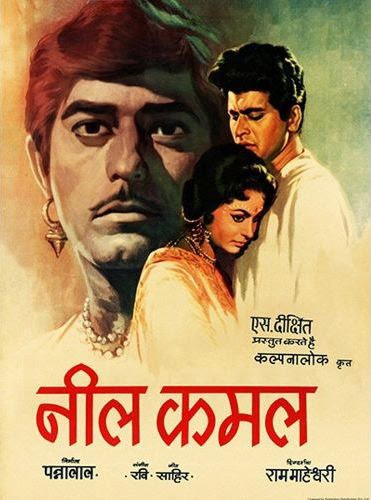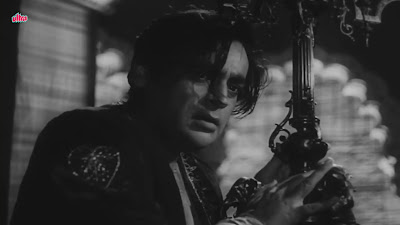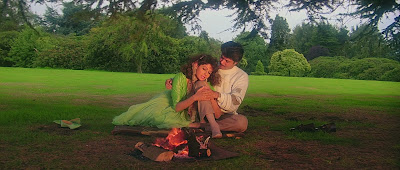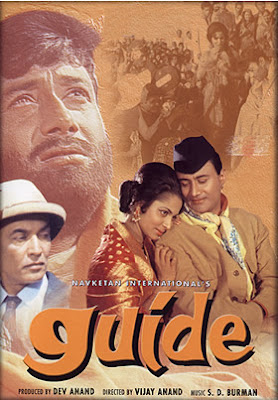Directed by: Yash
Chopra
Starring: Rishi Kapoor,
Sridevi, Vinod Khanna, Waheeda Rehman, Anupam Kher
Released: 1989
My rating: destroy
every copy – horrible – bad –
whatever
– flawed but enjoyable - good – great –
amazing
Chandni is iconic. No
doubt about that. Even if only for introducing the myth of Yash
Chopra´s „eternal woman in white“. Myth, because after Chandni,
she hardly appears in any other of his films. Yet so deep is the
image of Sridevi dancing an enticing tandav engrained in all our
minds, that we accept her as something definite. Yash Chopra´s
„woman in white“ has always been adn always will be Sridevi in
Chandni, and no one else. However much like another film that set
certain standards - Dilwale Dulhania Le Jayenge - Chandni too is a
movie that has its own problems, and though iconic, it ain´t
untouchable. So let´s touch it today, with some delicacy and some
less delicacy as well.
Rishi Kapoor plays an
obnoxious rich dude who employs all the annoying, forceful ways of
getting closer to a girl he likes, and pretty much gives her no
choice in matter of loving him back. When life turns tables on him
and does not go the way he planned it to, he falls into depression,
gives up completely, and slips into a hardcore self-pity mode. In
short he is a douche. Sridevi plays beautiful, annoying in her
childish mode, touching in her serious mode, Chandni, who likes to
dance in the rain and is... well... beautiful. That truly seems the
most prominent feature that Yash Chopra chose to endorse in his
heroine that time. Sridevi with her thick mane of hair, long limbs,
shy smiles and of course those huge eyes looked like a fairy-tale
come true. The first half is cruel to her character though, as she is
merely dragged along by Rishi and his family. But Chandni also
manages to pick up the pieces of her shattered heart and make a new
life for herself, complete with a successful career job and a new man
who falls in love with her.
Enter grief-stricken Vinod
Khanna, whose mother Waheeda Rehman is probably closer to him in age
than his first pyaar Juhi Chawla, who appears in a small but sweet
cameo. He is all that Rishi Kapoor (in this film) is not. Thorough
gentleman, principled, going after his desires but not forcing
himself where he is not wanted. So naturally he does not get the girl
in the end, because Rishi suddenly decides he wants Chandni back –
and much like in the beginning he blackmails her into a renewed
relationship. Sigh. I was ready for Hum Dil De Chuke Sanam after
this, to heal my aching soul. The score of the film did its share of
healing too, for if there is something worth going back to, it´s the
music – yes, including the out-of-tune Sridevi parts of „Oh meri
Chandni“. The already mentioned wild tandav in nature is stunning
and „Tere Mere Hoton Pe“ remains possibly my favourite track ever
picturized on Sridevi. Chandni is also, quite possibly, the last film
in which I was ready to accept Rishi Kapoor as a romantic hero. No
matter what problems the characters displayed, all the actors did a
good job with their roles, even if Anupam Kher going around and
mouthing tutotial on life and love was boring. Again, I much prefered
his meddling in Lamhe than here.
 |
| Did I mention these two get their own Switzerland song? |
Chandni is one of the best
known Yash Chopra films, and was one of his most successful
ventures, however compared to let´s say Lamhe it lags behind, as a
nice, but all in all average film. It is a notch better than Kabhi
Kabhie though, being more tight in screenplay and not bothering about
too many characters. Furthermore in spite of the obnoxious boyfriend
(hell he even tricks the girl into getting drunk in pursuit of bodily
pleasures), Chandni must have been a revelation at the time when
action masalla had its boom. It aimed for simplicity and lots, lots
of romance, on which it delivered (though there is still the question
of the douche who initiates it all. And the whole Switzerland bit was
unneccessary.). I have given up on Yash Chopra films being great in
terms of script, rather it is best to simply let go and try and enjoy
the atmosphere he managed to create. With this film he succeeded in
conjuring up a charming little thing, even if only with help of
Sridevi´s beauty and lovely music.














+-+DVDrip+-+XviD+-+Esubs+%5BTeam+Bindass%5D.avi_002654065.jpg)
+-+DVDrip+-+XviD+-+Esubs+%5BTeam+Bindass%5D.avi_000283824.jpg)
+-+DVDrip+-+XviD+-+Esubs+%5BTeam+Bindass%5D.avi_002123744.jpg)
+-+DVDrip+-+XviD+-+Esubs+%5BTeam+Bindass%5D.avi_004627619.jpg)
+-+DVDrip+-+XviD+-+Esubs+%5BTeam+Bindass%5D.avi_003461455.jpg)







.mp4_000036541.jpg)
.mp4_000044083.jpg)
.mp4_000115464.jpg)








%5BGuru+Gutt%5DHindi-DvdRip-Xvid+~+Smeet.avi_001762256.jpg)










